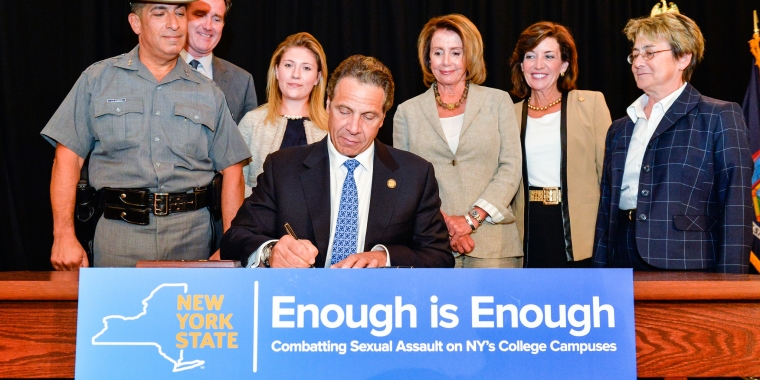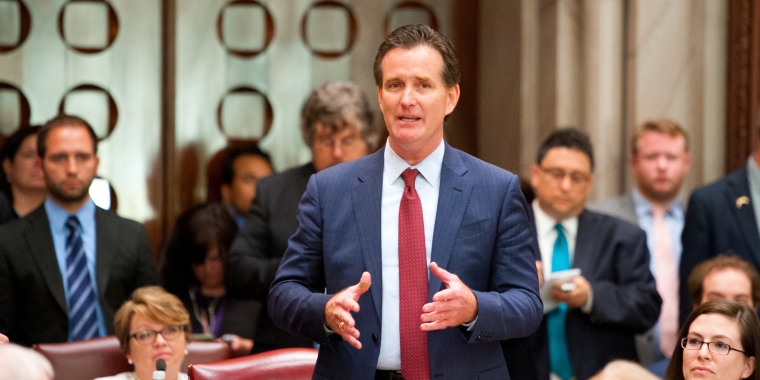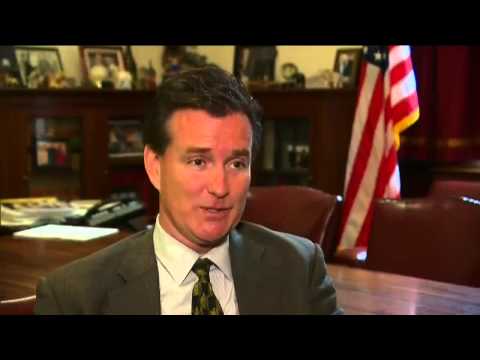
Majority Leader Flanagan Joins Governor Cuomo For Signing Of "Enough Is Enough" Legislation
John J. Flanagan
July 7, 2015
-
ISSUE:
- Higher Education

Majority Leader John Flanagan (2nd Senate District) joined Governor Andrew Cuomo and other elected officials at the official signing of the “Enough is Enough” legislation to combat sexual assault on college and university campuses statewide. The new law requires all colleges to adopt a set of comprehensive procedures and guidelines, including a uniform definition of affirmative consent, a statewide amnesty policy, and expanded access to law enforcement to ensure the safety of all students attending colleges in New York State.
Senate Majority Leader John Flanagan said, “This new law will combat and root out sexual assault so our college campuses are safe learning environments for all students. I thank Senator Ken LaValle for his hard work on this issue, as well as Governor Cuomo and Speaker Heastie, and I commend my colleagues and the advocates for working together to enact this extraordinarily important piece of legislation.”
Assembly Speaker Carl Heastie said, “Campus sexual assault must stop. Our students deserve safety and security as they pursue a higher education. This plan encourages victims to speak up and provides a uniform policy for handling accusations throughout all New York State colleges. The Assembly has worked diligently to see this bill become a law and I am pleased that Governor Cuomo has taken the lead in making this a reality.”
SUNY Chancellor Nancy L. Zimpher said, “As state leaders and educators, our first and foremost responsibility is to ensure that our college and university campuses provide a safe haven for students as they complete their higher education and work toward a degree. The ‘Enough is Enough’ legislation signed today is a promise of safe and secure learning environments for students attending college anywhere in New York State, and SUNY has been proud to serve as the policy model for these comprehensive reforms. With this historic bill, Governor Cuomo and the legislature have further positioned SUNY and New York to lead the nation in combating sexual assault and violence on college campuses.”
This legislation was first proposed by Governor Cuomo in January and will extend the preventive policy and protections adopted by SUNY campuses to all university campuses statewide.
Specifically, the new law requires private colleges in New York State to adopt or implement:
- A uniform definition of affirmative consent, defining consent as a knowing, voluntary, and mutual decision among all participants to engage in sexual activity;
- An amnesty policy, to ensure that students reporting incidents of sexual assault or other sexual violence are granted immunity for certain campus policy violations, such as drug and alcohol use;
- A Students’ Bill of Rights, which campuses will be required to distribute to all students in order to specifically inform sexual violence victims of their legal rights and how they may access appropriate resources. The Bill of Rights clearly states that students are given the right to know they can report sexual assaults to outside law enforcement, including the State Police;
- Comprehensive training requirements for administrators, staff, and students;
- Reporting requirements for campuses to annually submit aggregate data on reported incidents of sexual violence and their adjudication and handling to the State Education Department.
Additionally, the new law includes:
- The creation of a new unit within the State Police called the “sexual assault victims unit,” with a focus on advanced training in responding to sexual assaults and related crimes that shall also provide assistance to campus police or local law enforcement, as well as training to college campus communities;
- To help combat campus sexual assault, a commitment of $10 million will be divided among various partners: $4.5 million to rape crisis centers to provide services and resources to students, $4.5 million to the State Police to create sexual assault victims unit, and $1 million to colleges and universities; and
- A requirement for first responders to notify survivors of their right to contact outside law enforcement.



